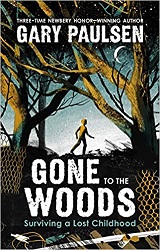
 Gone to the Woods
Gone to the WoodsSurviving a Lost Childhood
Review posted January 30, 2022.
Farrar Straus Giroux, 2021. 357 pages.
Review written January 13, 2022, from a library book
Starred Review
2022 Capitol Choices Selection
2022 Sonderbooks Stand-out:
#2 Teen Nonfiction
Oh wow. This book is heart-wrenchingly beautiful. The illustrious children’s author Gary Paulsen writes about his childhood, during which he didn’t get to be a child very much of the time. This book came out not long before his death in 2021. I love the part at the back of the book when he describes himself deciding to write this book.
No longer a boy, he lived and filled the years and saw thousands of hills and oceans and forests and mountains and cities and some ugliness and much more beauty and people, God, all the people until finally, at last he came of an age, an old age, a still older age.
Eighty years.
Eighty glorious years absolutely packed with life.
And one day, living in a shack in the New Mexico mountains, he looked in an old box of things from his life, from moving, and saw one of the old blue Scripto notebooks that had somehow followed him in his life. And he picked up the notebook and opened it and found it was the story of the deer killed by hunters that he had written for the librarian.
But more, still more, there were empty pages after the story. Discolored, but he could still see the lines, the beautiful lines that still, after all these years, called to him, dared him, and he sat down and found a pencil and thought:
What the hell.
Might as well write something down.
My library has put this book in juvenile nonfiction, and although I don’t dispute that, I’m going to file this review with teen nonfiction. Although Gary Paulsen writes mainly about his childhood, he finishes when he enlists as a soldier at seventeen, and he saw some horribly difficult things along the way. Things like horribly wounded soldiers when he traveled on a train alone at age five, and later women and children eaten by sharks as he watched on a transport ship, and “night people” obliterated by machine gun fire when they tried to climb the fence around the American military compound in Manila.
So yes, this book has some horrible and hard things, but so much of it is tender and beautiful. Almost half the book is at the beginning when “the boy” at five years old was suddenly sent to his aunt and uncle who lived in an isolated farm (not even a phone line) in the North woods. There he learned to hunt for mushrooms, milk cows, fish, camp in the woods, and so much more. This part just bursts with love and awe for the beauty around him.
But then his mother showed up and they traveled to his father, stationed in Manila. Things got much harder and now instead of learning woodcraft, he learned street smarts. Back in the United States, living a life of his own with his drunk parents not paying any attention, my heart was captured and then wrung out with the story of how a librarian won his trust. And after she gave him the first whole books he ever read on his own, she presented him with a notebook and pencil and suggested that he write down his own stories and the mind pictures that came up as he read.
And so the seeds were planted for the boy to become a beloved children’s author.
I highly recommend this book for anyone from young teens to adults. I promise your heart will be touched. And I’m so happy to know what Gary Paulsen thought about his life before he died. His years were absolutely packed with life.
